|
|
|
Sort Order |
|
|
|
Items / Page
|
|
|
|
|
|
|
| Srl | Item |
| 1 |
ID:
092211
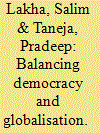

|
|
|
|
|
| Publication |
2009.
|
| Summary/Abstract |
Contemporary globalisation is viewed both as offering immense opportunities and posing a fundamental threat to the nation-state and democratic governance. To the proponents of globalisation, integration into the world economy through liberalisation of foreign trade and capital flows, combined with deregulation of the national economy, promises greater economic efficiency, higher consumption levels and generally improved living standards. For them, state intervention in the economy aimed at restricting the free play of market forces is dysfunctional, resulting in lower social and economic benefits for the population at large. Within this optimistic perspective, globalisation is thought likely to 'flatten' economic differences between nations1 and lead to a 'borderless world',2 where the barriers to flows of capital, technology, and information will be minimised if not totally removed.
|
|
|
|
|
|
|
|
|
|
|
|
|
|
|
|
| 2 |
ID:
190809
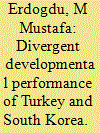

|
|
|
|
|
| Summary/Abstract |
Turkey’s per capita income was nearly three times South Korea’s in 1962. Dramatic change has been observed since then. South Korea has transformed into an innovative economy approaching the global technology frontier in only a few decades. Turkey, on the other hand, has attained limited success with missed opportunities and has fallen behind. This article asks why this spectacular success was observed in South Korea, but not in Turkey. It seeks an answer by concentrating on certain variables that may explain this outcome. Assuming that primarily different types and capacities of societies and states explain the variations in economic performance, the article examines in particular, the institutional foundations of Turkish and Korean societies.
|
|
|
|
|
|
|
|
|
|
|
|
|
|
|
|
| 3 |
ID:
141101
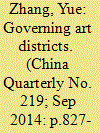

|
|
|
|
|
| Summary/Abstract |
Contemporary Chinese artists have long been marginalized in China as their ideas conflict with the mainstream political ideology. In Beijing, artists often live on the fringe of society in “artist villages,” where they almost always face the threat of being displaced owing to political decisions or urban renewal. However, in the past decade, the Chinese government began to foster the growth of contemporary Chinese arts and designated underground artist villages as art districts. This article explores the profound change in the political decisions about the art community. It argues that, despite the pluralization of Chinese society and the inroads of globalization, the government maintains control over the art community through a series of innovative mechanisms. These mechanisms create a globalization firewall, which facilitates the Chinese state in global image-building and simultaneously mitigates the impact of global forces on domestic governance. The article illuminates how the authoritarian state has adopted more sophisticated methods of governance in response to the challenges of a more sophisticated society.
|
|
|
|
|
|
|
|
|
|
|
|
|
|
|
|
| 4 |
ID:
092194
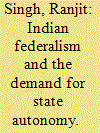

|
|
|
|
|
| Publication |
2009.
|
| Summary/Abstract |
The essence of federalism lies not in the constitutional or institutional structure but in society itself. A federal government is a device by which the federal qualities of a society are articulated and protected.
|
|
|
|
|
|
|
|
|
|
|
|
|
|
|
|
| 5 |
ID:
137364


|
|
|
|
|
| Summary/Abstract |
Theories that explain post-Mao China's economic success tend to attribute it to one or several ‘successful’ policies or institutions of the Chinese government, or to account for the success from economic perspectives. This article argues that the success of the Chinese economy relies not just on the Chinese state's economic policy but also on its social policies. Moreover, China's economic success does not merely lie in the effectiveness of any single economic or social policy or institution, but also in the state's capacity to make a policy shift when it faces the negative unintended consequences of its earlier policies. The Chinese state is compelled to make policy shifts quickly because performance constitutes the primary base of its legitimacy, and the Chinese state is able to make policy shifts because it enjoys a high level of autonomy inherited from China's past. China's economic development follows no fixed policies and relies on no stable institutions, and there is no ‘China model’ or ‘Beijing consensus’ that can be constructed to explain its success.
|
|
|
|
|
|
|
|
|
|
|
|
|
|
|
|
| 6 |
ID:
148520
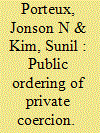

|
|
|
|
|
| Summary/Abstract |
This study explores collaboration between state actors and non-state specialists in the market for coercion. We focus on the case of forced evictions in South Korea, where violence carried out by private companies has occurred with the implicit, and at times explicit, sanctioning of the state. This level of government–private security cooperation has traditionally been explained by various hypotheses, including arguments about the weak capacity of a state to enforce compliance, trends in the neo-liberal marketization of state power, or as the outcome of a state being captured by the capitalist classes. Documenting the history of urban redevelopment projects and changes in government responses to major protest incidents in Korea, we instead argue that this niche market for private force is an observable implication of a shift in state–society relations in the wake of democratization. This phenomenon is, in effect, a very undemocratic response to democratization, by state elites.
|
|
|
|
|
|
|
|
|
|
|
|
|
|
|
|
|
|
|
|
|